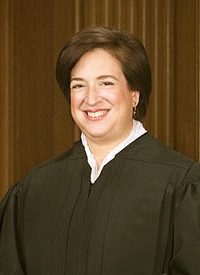
Emails released in response to Freedom of Information Act requests (and then lawsuits) from the Media Research Center and Judicial Watch have raised even more questions about how much then-Solicitor General Elena Kagan (left) was involved with the proposed ObamaCare legislation. At the time of now-Supreme Court Justice Kagan’s Court confirmation hearings, Senate Judiciary Committee Republicans asked if she had “ever been asked about [her] opinion” or “offered any view or comments” concerning “the underlying legal or constitutional issued related to any proposed health care legislation, including but not limited to Pub. L. No. 111-148 [ObamaCare], or the underlying legal or constitutional issues related to potential litigation resulting from such legislation.” Kagan’s answer was an unqualified “no.”
The newly released emails, however, show that days before the House vote on the healthcare legislation, Kagan was indeed involved in preparing the Department of Justice response to a legal challenge of the bill. This challenge was anticipated by Mark Levin and the Landmark Legal Foundation if the bill was passed through a House procedural rule which would have deemed the bill to have passed the House of Representatives, even if its members had never actually voted on its last version.
Federal statute 28 U.S.C. 455 requires any member of the Supreme Court to recuse himself or herself from any proceeding in which his [or her] partiality might reasonably be questioned or if he or she had expressed an opinion concerning the merits of the particular case in controversy [while serving] in government employment. Department of Justice lawyers insisted that the email record would show that Kagan had been “walled off” or secluded from such proceedings. However, when Mark Levin who served in the Justice Department under President Reagan reviewed the emails, he discovered that Kagan had freely discussed issues related to the proposed healthcare legislation and the subject of its being “deemed passed.” He commented:
If she had been “walled off” from the matter, where is the evidence for that? Who was the gatekeeper? In fact, the emails demonstrate that her subordinates were ensuring that she was kept informed about events and potential legal issues, including Landmark’s draft complaint, which was prepared to challenge the Slaughter rule and then-Speaker [Nancy] Pelosi’s attempt (albeit abandoned) to bypass the Constitution’s law-making requirements. At a minimum, it does not appear that Kagan was forthright during her confirmation testimony about the extent to which she was kept apprised of Obamacare.
That may, in fact, now be the greater problem for Kagan and the Obama Justice Department. While the evidence would indicate that she should recuse herself from next summer’s Supreme Court hearing states challenges to ObamaCare, a growing number of critics are saying that it appears that Kagan and other Justice Department officials conspired to mislead [and possibly lie to] Congress on a substantial issue, and then conspired again to hide that misconduct.



